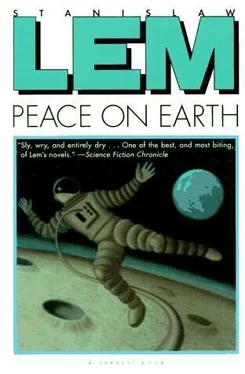I was willing. It was only much later that I realized they weren’t Ijon Tichy fans at all but had read me strictly in the line of duty. Their task, with many other Lunar Agency people (whom I won’t mention so as not to immortalize them), was to pull me gradually into the Mission. Why gradually? Because I could refuse, after all, and go home, taking with me all the secrets of the Mission. And what if you did? asks someone from the audience, a heckler. Would that be the end of the world? The point is yes, possibly, it would. The person selected from thousands by the Lunar Agency had to be both extremely capable and extremely loyal. Capable we understand, but loyal? And loyal to whom, to the Agency? Yes, inasmuch as it represented the interests of humanity. No nation or coalition of nations could be allowed to learn the results of the lunar reconnaissance, assuming it succeeded, because whoever knew the state of the weapons there first would gain, by that strategic information, immediate supremacy on Earth. The peace, in other words, was far from idyllic.
So the friendly scientists who let me play with the remotes as a child with a toy were actually dissecting my mind, that is, the computers were, invisible but analyzing our every conversation. Castor Cybbilkis, with his surrealist ties, was there as a theoretician of disastrous endgames, because precisely such a game was being played with me, against me. In order to accept or reject the Mission, I first had to learn about it, but then if I rejected it or if I accepted, returned, and then divulged the results of the reconnaisance, known only to me, it would create a situation the algomathematicians called pre-catastrophic.
The candidates were of different nationalities, races, professions, and accomplishments. I was one of many though I had no idea of that. The person selected would be a delegate of humanity, not a spy — or potential spy — for any country. His code name would be Missionary. But I was kept in the dark as much as possible. When they finally made me Missionary and I had crawled into the rocket for the n th time only to crawl back out two hours later in my space suit bristling with wires and tubes because again something had gone wrong during countdown, I finally had time to think about the past few months and put two and two together. I understood now the game the LA had been playing with me for the highest possible stakes. If not the highest for humanity and the world, certainly the highest for me: I didn’t need algomathematics and game theory to see that the simplest way for them to ensure secrecy in this situation was to do away with the pilot immediately after his return to Earth, as soon as he made his report. Knowing that they had to send me now, since I had shown myself to be the best of the candidates, I told this to my dear colleagues, the Cybbilkis brothers, Kuschtyk, Blahouse, Tottentanz, and Garraphizi (more about Garraphizi later) who along with a few dozen communications technicians would be the ground support for my selenological expedition, that is they would be for me what Houston was for Armstrong and Co. during the Apollo mission. To make those hypocrites as uncomfortable as possible I asked them if they knew who would take care of me after my return as a hero — the Lunar Agency itself or a hired gun?
That’s what I said, in those exact words, to see their reaction. If they had considered that scenario, they would understand me immediately. They froze. It made quite a picture: the small area in the cosmodome called the Waiting Room, with its Spartan décor — coke machines, card chairs, metal tables covered with bilious green plastic — and I in my angel-white space suit, my head under my arm (actually my helmet, but that’s how you say it: your head’s under your arm when you’re ready to fly), and facing me, my loyal comrades, scientists, doctors, engineers. I think it was Castor who spoke first. That it wasn’t their doing, it was the equation, the computer, because if you looked at the thing mathematically, abstractly, the solution to the problem of ensuring secrecy did not take into account any coefficient of ethics, and I was insulting them all by suggesting, at such a moment, that they were in on it.
“I’ve heard that before,” I answered. “Blame it on the computer! Sure, sure. But forget ethics for the moment. I know, you’re all saints and I’m one too. But didn’t any of you, the computer included, think of this?”
“Of what?” asked a hangdog Cybbilkis.
“That I might suspect, and might confirm my suspicion, as I’ve done just now. Surely that will affect the equation of my loyalty…”
“Oh of course that was taken into account,” said the other Cybbilkis. “It’s the ABC of algomathematical statistics: I know that you know that I know that you know that I know. The infinite series of conflict theory.”
“Very well,” I said, getting interested in the scientific aspect of the thing. “Then how did it work out for you in the end? Does or doesn’t the confirmed suspicion affect my loyalty?”
“It does,” admitted Castor Cybbilkis reluctantly. “But the second derivative of the curve of your loyalty after a scene like this one (taking place as we speak) shows a leveling off to zero.”
“Aha.” I scratched my nose, shifting the helmet from my right arm to my left. “So that what is now happening decreases the mathematical expectation of reduction of my loyalty?”
“It decreases it,” he said. And his brother added, looking at me both kindly and searchingly: “You yourself probably feel…”
“Exactly,” I muttered, realizing, not without surprise, that they were right, they or the computer, in this psychological calculation: my indignation had noticeably diminished.
The green light went on over the exit to the launch pad and all the buzzers sounded, indicating that the problem had been corrected and I was to get in the rocket again. I turned without a word and walked, they in attendance, and as I walked I thought. I’m getting ahead of myself here, but I have to finish. After I left stationary earth orbit and they couldn’t touch me, when they asked me how I felt, I answered fine, and that I was considering whether I shouldn’t make friends with the “nation” of the moon in order to give a few people I knew on Earth a good kick in the pants. How hollow was their laughter in my earphones…
But that came later, after my trips to the simulated lunar testing range and the visit to Gynandroics. That corporation has greater earnings than IBM, even though it began as a small subsidiary of the company. I should explain here that Gynandroics, contrary to popular belief, doesn’t manufacture robots or androids, if by those terms we mean humanlike machines endowed with human intelligence. It’s practically impossible to put a human mind in a machine. The computers of the eightieth generation and beyond are more intelligent than we, but their minds bear no resemblance to a human being’s. Man is a highly illogical creature and therein lies his humanity. He has reason, yes, but it is heavily polluted with prejudices, emotions, and attitudes carried from childhood or the genes of the mother and father. That’s why a robot passing for a person (over the telephone, for instance) is fairly easily unmasked. Nevertheless the porn industry put a limited line of S-dolls on the market, S for sex. These didn’t catch on; they were too logical, too intelligent; a man going out with one would end up with an inferiority complex. And they were expensive. Why pay $90,000, not counting local taxes, when you could have a natural partner for much, much less? The real revolution in the sex market was caused by remotes, or “empties,” dolls also fashioned in the image of humans but brainless, brainless not in a pejorative sense but literally: the remote woman and the remote man were empty shells operated at a distance by humans.
Читать дальше












